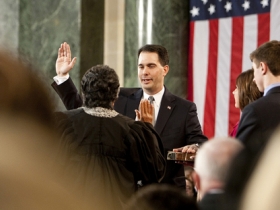Did Republicans Blow It?
The court decision striking down collective bargaining law exposes obvious constitutional problems with it.
When Gov. Scott Walker first proposed the law to restrict collective bargaining for public employees, most Democratic and Republicans were stunned by the broad sweep of the law. It was a revolutionary document.
Given this, you’d think the Walker administration would have sought a legal opinion on the constitutionality of the bill from, say, the Wisconsin Attorney General. The public policy goal of slashing public employee wages and benefits might have been accomplished with a bill written in many different ways. So why not make sure the one you have written will pass muster with the courts?
The Walker administration never did this. Precisely who conceived the bill’s approach, where it came from, has been shrouded in mystery. Walker’s not a lawyer. (He didn’t even graduate from college.) Was there a lawyer driving this train?
In the wake of its passage, some liberals blamed the conservative American Legislative Exchange Council, which has created ready-made bills in many areas, but Mary Bottari, a staff member of the liberal Center for Media and Democracy, who analyzed the influence of the group on Wisconsin, found there was “no ALEC bill that mirrors Walker’s proposal.” I’ve heard of no other state with a bill written quite like Wisconsin’s. Perhaps there are constitutional reasons for this.
Which brings us to Friday’s decision by Dane County Circuit Court Judge Juan Colas to overturn the law. The court looked at six constitutional challenges to Act 10 and found two lacked merit and struck the law down on four other issues.
Back when Act 10 was proposed, Milwaukee City Attorney Grant Langley issued a 15-page opinion concluding the law was unconstitutional. “From my perspective, there is no wiggle room,” he said. Langley said that eight other city lawyers with expertise on pension law carefully researched the law and came to the same conclusion.
Langley’s opinion said the bill interfered with the city’s long established home-rule authority over its pension plan and violates its employees’ contractual rights. Colas came to exactly the same conclusion by first, noting the home rule authority gave Milwaukee control over its pension plan and second, noting that Act 10 impaired the city’s contract with employees, which promised to pay their share of pension contributions and had language prohibiting “retroactive impairment.” This is “a contractual obligation for the city,” Colas wrote, which Act 10 violates by making city employees pay 5.5 percent.
Colas also ruled that Act 10 infringes “upon the right of free speech and association guaranteed by both the Wisconsin and United States Constitution” in two ways. First, by treating union and non-union employees differently. Represented employees, he wrote, may enjoy their rights of association in a union “only if they give up the right to negotiate” wages and their right “to receive wages greater than the cost of living.” But non-union employees “are rewarded by being permitted to negotiate for and receive wage increases without limitation.”
A second infringement, Colas ruled, is that “Unions are required to be recertified annually, even if there has been no request for recertification and the full costs of the election are borne by employees in the bargaining unit who are members of the union.” This statute burdens the exercise of free speech and association and rewards the abandonment of that right.
Colas also ruled that the law violates the equal protection clause of the constitution, once again in two ways. First it “treats members of a similarly situated class” (government employees) unequally, by giving different treatment to union and non-union employees. Secondly, it treats government employees unequally by prohibiting payroll deduction for union dues of general municipal employees but allowing it for public safety (police and fire) and transit labor organizations.
This is a fairly sweeping decision, but the plaintiffs only represented teachers and Milwaukee employees. It therefore has no impact on state employees, but it opens the door to a similar suit making the same arguments on behalf of state employees. It also opens the door to federal suits on the same issues, as Colas found the law violated both the state and federal constitutions. In short, there could be a lot more litigation on this case. Lester Pines, the attorney for the plaintiffs, says he is convinced the law is unconstitutional, and that the problems with the law will it make it difficult even for the Wisconsin Supreme Court, which typically leans conservative by one vote, to uphold the law.
In response to the court’s decision, Walker immediately condemned Colas as “a liberal activist judge” without discussing any of the case’s details. Similarly, Rep. Robin Vos (R-Rochester) said “A judge living in the fantasy world of Dane County has decided they are going to substitute their singular opinion as opposed to the collective will of Wisconsin.”
The message is that judges, jurisprudence and the entire judicial branch of government is just a charade. Colas (who, by the way, previously served as both a prosecutor and defense attorney) is just a liberal pretending to consider the constitutional questions. Of course, that cynical view opens the door to the same conclusion should the Wisconsin Supreme Court overturn Colas — that it’s just a bunch of conservatives imposing their opinions.
In fact, there are important constitutional questions involved here. When Walker and Vos respond by attacking Colas for doing his job, they spread the message that we are not really a government with three branches. And they leave you wondering if they fear the law they wrote has some problems.
Short Takes
-News accounts about an appeal to federal appeals have confused this issue. That is an appeal of an earlier, different challenge to Act 10 on much narrower grounds that has nothing to do with the Colas decision.
-On Saturday, a Milwaukee Journal Sentinel reporter did a story quoting Lester Pines criticizing Walker for his attack on the judge. Pines noted that this was bad form, undermining the judicial system, and also bad strategy by Walker, because you never know when you might need that judge on a future case.
No, I can’t give you the exact quote because by Sunday, that part of the story was wiped clean, and a revised story had eliminated all of these quotes from Pines. That might make sense for the print version, where space can be an issue, but it is disturbing to see the JS do this online, because it is clearly a case of the editors sanitizing a story. The newspaper is now erasing its own history.
-Does the county have a two-tier parks system? In response to my story on this, reader Eric Jernberg, who worked for years for the county, ticks off the many pools in poor neighborhoods on Milwaukee’s North Side that have been closed.
-And former JS reporter Gretchen Schuldt, our new senior contributing writer, offers an inside look at the federal investigation finding the state has blatantly ignored civil rights law in its transportation policies.
Murphy's Law
-
National Media Discovers Mayor Johnson
 Jul 16th, 2024 by Bruce Murphy
Jul 16th, 2024 by Bruce Murphy
-
Milwaukee Arts Groups in Big Trouble
 Jul 10th, 2024 by Bruce Murphy
Jul 10th, 2024 by Bruce Murphy
-
The Plague of Rising Health Care Costs
 Jul 8th, 2024 by Bruce Murphy
Jul 8th, 2024 by Bruce Murphy























Is your head spinning these days? It is hard to keep up with twitter, facebook, and email. Stop wasting valuable time looking for good parking spaces and get the government bloated with life’s complexities off our back. Be “right” all the time. It’s a state of grace and a lot of fun.
Cut to the chase. Take “jurist” (an expert who writes laws) out “jurisprudence”. Stop using words that look the same but have different meanings. Be “imprudent”. Don’t talk with anyone who has spent their life in a state of confusion, skepticism, and doubt reading the fine print of the law.
Thank you for disabusing me of the notion that ALEC had written Act 10; this now opens the door to ask, “If not ALEC, then who wrote this law?” One must at least wonder if Michael Best et alia, the “billable hours or bust” crew (who manage to bust rather often, considering their fees) had a hand in it.
One must also wonder how much of Act 10 a governing Governor (rather than a dictating one) might have locked up. And one must wonder, between his crumbling, short-term legacy and his on-going John Doe legal defense fund/investigation, if Mr. Walker hasn’t effectively Palined his political career.
Mr. Walker would have done well to complete his college career–spending some time in philosophy and science classes where, in their own way, some pretty bright people manage to teach some not-so-bright people that there is a difference between fantasy and reality.
this is why we need to ignore all that crap and just enforce the anti-collective-bargaining law. We all know it’s for the best. It saved 1 billion dollars for wisconsin and it’ll save more. Maggie Thatcher would have liked it, Reagan would have liked it, and I like it! http://okmed.wordpress.com/2012/09/17/this-is-so-good-but-so-sad/
@Fred, so if a law is unconstitutional, it’s ok as long as it “saves” money? That billion was paid for by a small group of middle and lower-middle class (extremely poor if you use Romney’s idea of middle being $200 – $250K/yr), effectively removing a billion dollars from Wisconsin’s economy. That’s a billion dollars not being spent at local businesses, that’s a billion dollars not going to job creation due to increased demand, etc. But hey, as long as your property taxes when down a couple dollars and you got a raise, who cares right?
So, Fred. Since we all know that eliminating guns would save lives, we know that’s for the best. Therefore, using your reasoning, we should ignore the Constitutional rights of citizens and make a law doing just that. Oh, no wait. We can’t ever do anything that would go against the Constitution. Or is that for just the things that our agenda believes in?
If the state government can allow union bargaining as id did under Gaylord then it can disallow it.
Gretchen Schuldt, the woman who lied about Tom Reynolds campaign expenses.
Interesting comment from Robin Vos, given all his personal legal problems, not to mention the apparent voter fraud of his estranged wife.
When I heard the law had been declared unconstitutional, my initial thought was that it did not matter because our conservative Walker backing supreme court would just throw that out. Reading this article is encouraging, however. Arguments presented are logical and if WI supreme court does throw it out, it will reflect very negatively on them. One can only hope the US court is less biased!
What do these three major pieces of recent Wisconsin Republican legislation have in common, besides all or parts being deemed unconstitutional?
It could certainly be argued that all three were politically motivated to gain an electoral advantage as well as rushed through the legislative process. By drastically reducing public union membership (Act 10) and power, the WIS GOP further advances their funding advantage. Through Voter ID (Act 23), they suppress the minority, poor, elderly and young, traditionally Democratic vote. The highly secret redistricting process and the resulting Republican advantage (Act 43) is an obvious political power play.
Rather than complaining about an isolated “liberal activist judge,” Wisconsin Republicans should begin to realize beauty and logic of judicial review and the separation of powers. It is in place for exactly the reason it is being criticized. To prevent laws which guarantee the continuation of political power and minimize sound public policy.
So, yes, in their lust for power and advantage, the Republicans blew it.
WI Act 10 on collective bargaining enjoined from implementation, based on violation of the Wisconsin Open Meetings law, by Dane County Circuit Judge Maryann Sumi.
WI Act 10 on collective bargaining enjoined from implementation, based on violation of the Wisconsin Open Meetings law, by Dane County Circuit Judge Maryann Sumi. (Reissued after the Wisconsin legislature ignored the original injunction)
WI Act 43 on redistricting ruled unconstitutional by a panel of 3 Federal judges, comprised of Diane Wood (Clinton appointee), a Democrat, in 1995; District Judge J.P. Stadtmueller (Reagan appointee), and Robert M. Dow (George W. Bush appointee)
WI Act 23 on voter ID ruled unconstitutional by Dane County Circuit Court judge Richard Flanagan
WI Act 23 on voter ID ruled unconstitutional by Dane County Circuit Court judge Richard Neiss
WI Act 23 on voter ID appeal refused by the Wisconsin Supreme Court, comprised of Shirley Abrahamson, Ann Walsh Bradley, N. Patrick Crooks, David T. Prosser, Jr., Patience Roggensack, Annette Ziegler and Michael Gableman
WI Act 10 on collective bargaining pertaining to annual recertification and dues deduction ruled unconstitutional by Federal Judge William M. Conley.
WI Act 10 on collective bargaining ruled unconstitutional and null and void by Dane County Circuit Judge Juan Colas
Walker shared openly, his thoughts on the Constitution to a grade school classroom;
“The Governor says it’s important to understand and appreciate the constitution, and the freedoms and liberties it grants us. World events right now remind us how lucky we are and that it is easy to take these freedoms and liberties for granted.”
. . .So take it from the man who knows first-hand, making international news doing so, how very easy this can be done.
http://wsau.com/news/articles/2012/sep/15/walker-discusses-us-constitution-at-wausau-school/
give such decisions be well studied and that incur a large number of all aspects and implications of those contained herein may become the least favored for this reason these decisions are so important